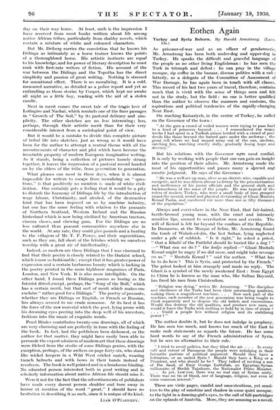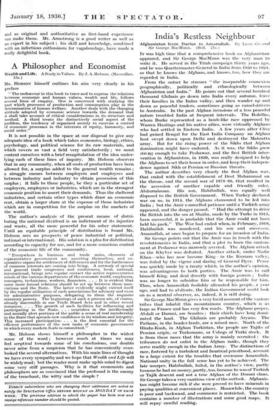Eothen Again
As prisoner-of-war and as an officer of gendarmerie, Mr. Armstrong has been both under-dog and upper-dog in Turkey. He speaks the difficult and graceful language of the people as no other living Englishman : he has seen the Turk in triumph and defeat : he can pray in the village mosque, sip coffee in the bazaar, discuss politics with a rah : latterly, as a delegate of the Committee of Assessment of War Damage, he has again been in touch with all classes. This record of his last two years of travel, therefore, contains much that is vivid with the sense of things seen and felt not in the study, but the field : no one is better qualified than the author to observe the manners and customs, the aspirations and political tendencies of the rapidly-changing Near East.
On reaching Kaisariyeh, in the centre of Turkey, he called on the Governor of the town :
" At the gate a crowd of veiled women were trying to pass food to a herd of prisoners beyond. . . . I remembered the weary weeks I had spent in a Turkish prison herded with a crowd of poor devils like those beyond the barred gate under the archway-; the great cell where we had moped away out of the sun, unclean, catching lice, watching cruelty dully, gradually losing hope and decency."
But his relations with the Governor were most cordial. It is only by working with people that one can, gain an insight into the position of their affairs. Mr. Armstrong made the most of his opportunities and passes many a shrewd and caustic judgment. He.says of the Governor : " Ile was a well-set-up man, alive as an electric wire, capable and energetic, and he was driven almost to frenzy by the procrastination and inefficiency of his junior officials and the general sloth and backwardness of the mass of the people. He was typical of the rulers of modern Turkey, who were a small body of men .grouped round the mental, moral and physical dictatorship of Ghazi Mustafa Kemal Pasha, and numbered not more than one in fifty thousand of the population."
Always and everywhere in the Near East, that fair-haired, beetle-browed young man, with the cruel and intensely sensitive lips, seemed to overshadow men and events. The will of Kemal is felt far beyond the confines of the Republic. In Damascus, at the Mosque of Selim, Mr. Armstrong found the tomb of Wahah-ed-din, the last Sultan, lying neglected
under a pile of rubbish. Is it right," he asked a priest, " that a Khalif of the Faithful should lie buried like a dog ? " —" What can we do ? " the hodja replied—" Ghazi Mustafa Kemal might be angry if we did more, and might take revenge on us." " Mustafa Kemal ? " said the author. " What has he to do here ? This is Syria, and protected by the French." The priest looked at him strangely and made no reply. The Ghazi is a symbol of the newly awakened East : from Egypt to China he is known as the man who, like Sultan Bayazid, has freed his race from Christendom.
Religion was dying," writes Mr. Armstrong. " The discipline and obedience of the Turks had been their outstanding qualities, making them a magnificent machine. . . . Now each part of the machine, each member of the new generation was being taught to think separately and to despise the old beliefs and conventions. Would this destroy the old qualities, and produce new ones, or would it leave the Turks with nothing to hold by in time of strain / . . . Could a people live without religion and its stabilising power ? "
The author doubts it, but he does not indulge in prophecy. He has seen too much, and knows too much of the East to make rash statements as regards the future. He has some hard words to say of the French administration of Syria, but he sees no alternative to their rule.
" I tried to avoid politics, but they filled the air. . . . In every café and corner of Damascus the people were indulging in their favourite pastime of political argument. Should they have a federation, or an united Syria ? Should they have a King or a President, and who should he be ? They talked of inviting a son of Ibn Saud, of Emir George Lutfullah, an Egyptian-Syrian millionaire, of Sheikh Tajediune, the Nationalist Prime Minister. . . . As yet, howyver, there was no real sign of Syrian unity.. There was no tie of blood, nor of language, religion, nor even of some common interest."
These are virile pages, candid and unsententious, yet sensi- tive to the play of sunshine and shadow in some quiet mosque, to the light in a dancing-girl's eyes, to the call of hill-partridges on the uplands of Anatolia. More, they are-amusing as a•novete
and as original and authoritative as first-hand experience can make them. Mr. Armstrong is a good writer as well as an expert in his subject : his skill and knowledge, combined with an infectious enthusiasm for vagabondage, have made a really delightful book.







































 Previous page
Previous page